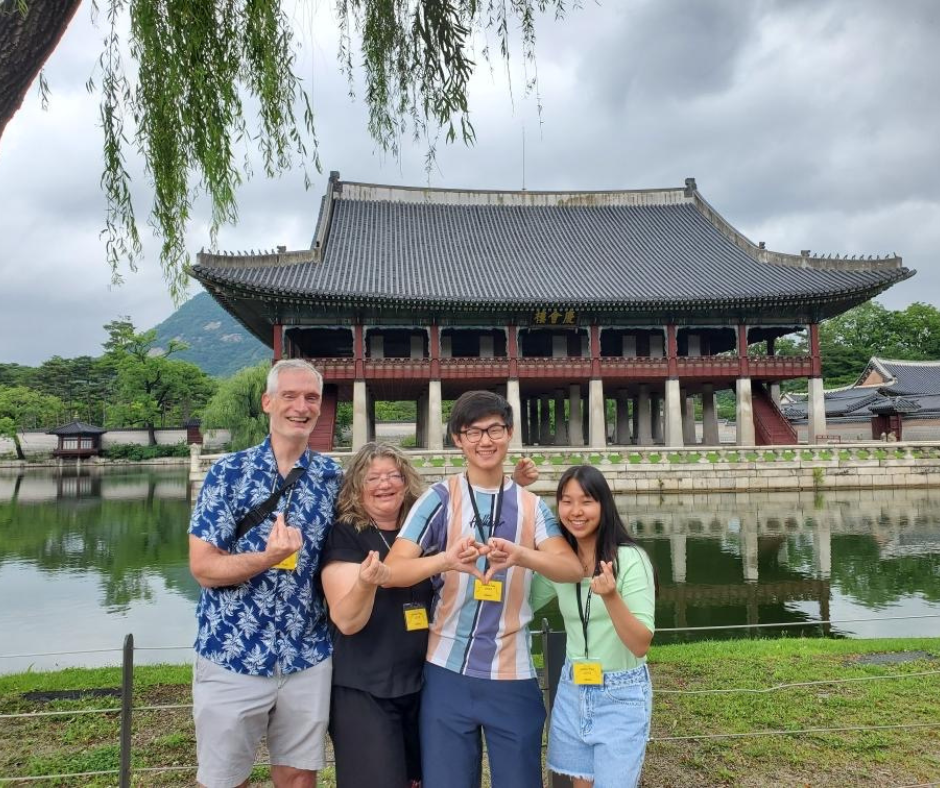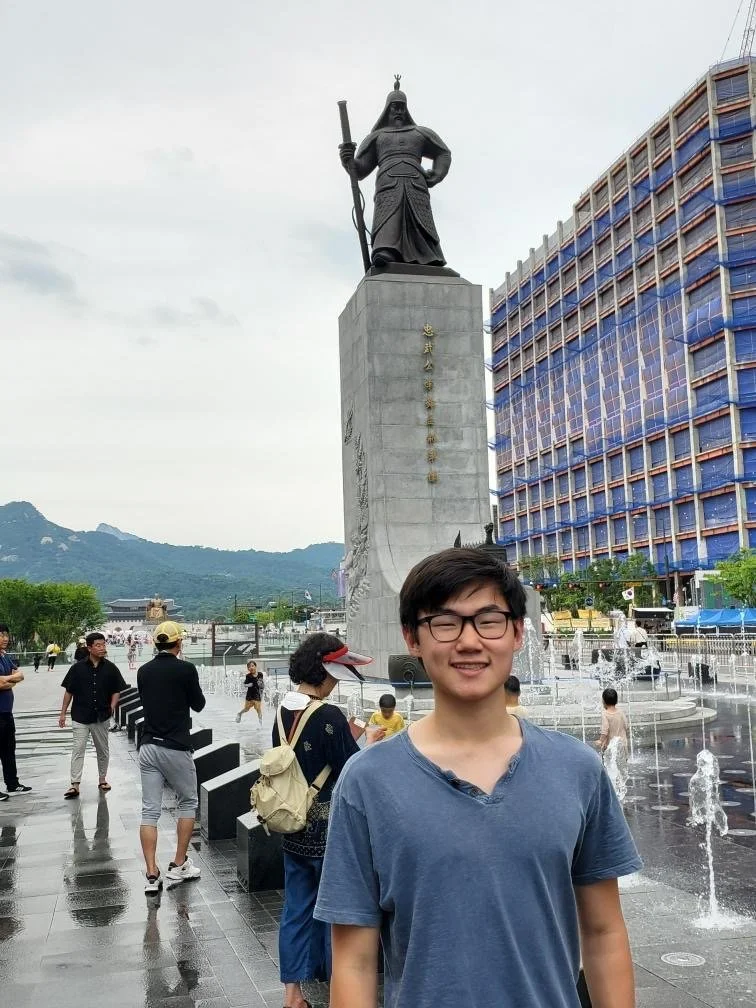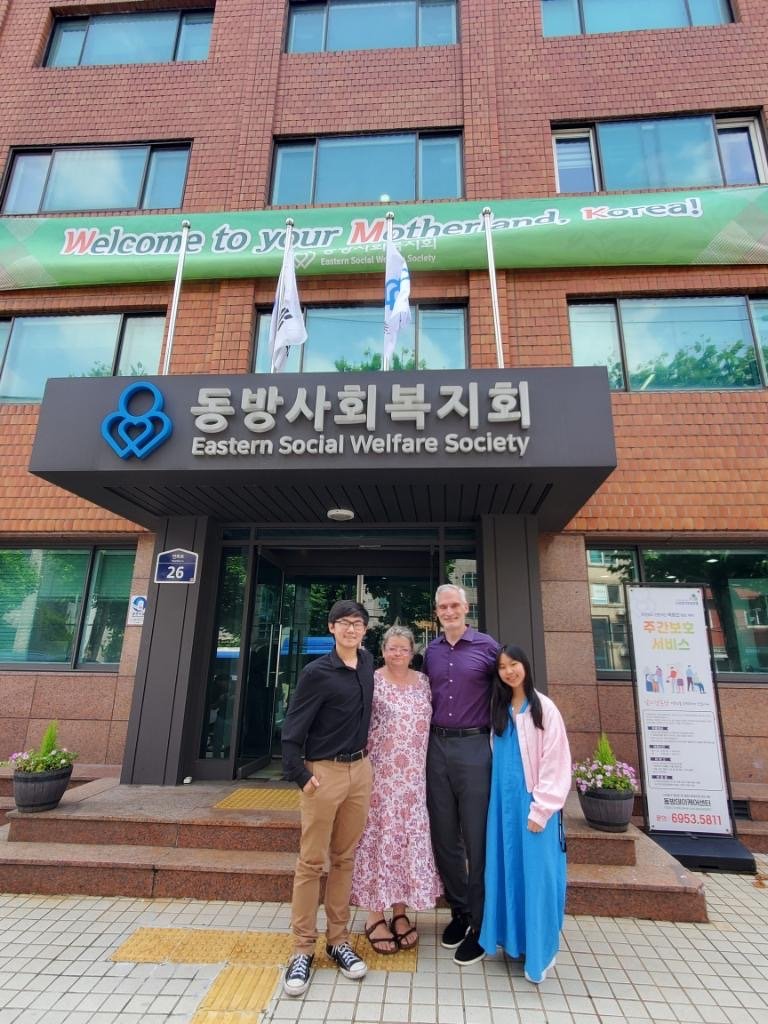Ties Travelers: Meet David
David and his family in South Korea 2023
Hi! I'm David, from the Chicago suburbs. I went on the Korean Ties trip in the summer of 2023. I currently attend the University of Wisconsin–Madison, where I'm studying political science and environmental studies.
Fun Fact: I've gone surfing on both coasts of the U.S.
Why I Chose Ties
I've always felt a desire to return to Korea. I wanted to discover that part of my identity and fill in the gaps in my understanding. But the adoptee experience is not simple, and going to Korea without support would have added more confusion as I explored my background alone. The Ties Program offered support and community as each individual learned and experienced our home country that we no longer called home. The program was designed with adoptees in mind, and the extra steps taken throughout the trip were invaluable in helping me understand and reconcile with my birth country.
A Wow Moment
At various points in the trip, I was struck with history that surrounded me. The first night in Seoul, I walked around the hotel area and saw the statue of Yi Sun-Sin in Gwanghwamun Square. That moment inspired me and made me realize what this trip would be, how much it would mean, and that I had finally made the journey I'd been thinking about for years. Those moments kept building, with each experience filling in parts of my story and the story of my two countries.
What I Want Future Adoptees and Families to Know
I think the most important thing for an adoptee to know is that you're going to be unable to be prepared for everything. There are going to be moments, experiences, events that'll happen that'll bring up responses—emotional, mental, physical responses—that you may not be prepared for. And that's okay. Because you're not necessarily going on this trip to get all of the answers, but you're going on this trip to be in a space where you can ask those questions and discover a little more about yourself and your identity and figure out what that means for you.
What I would want families to know is to understand what you want to get out of it. Because it can be hard as a family member or support to fully empathize with an adoptee who's going on this trip. But it's okay to want something for the adoptee and for the person you're supporting—and for yourself as well. It's more than just seeing a place you've always wanted to go to. It's about being the person that your adoptee goes to, or being open to talking about some of the hard conversations that might come up and helping that person through their emotional journey when they're ready for it.
I think it's important to remember that it's okay for you, as a family member, to have your own set of desires and goals—without forcing anything on the adoptee—being there to support them in your own way and in a way that fits your relationship.
Now, if someone is nervous, I'd say that's okay. Because you're going to be nervous. It's an incredible trip, a huge milestone in your journey as an adoptee, no matter where you are. The nerves are okay because you're going to be experiencing this home country of yours for the first time—at least most likely. And that can be daunting, it can be scary, but it's going to be fun too. And all those emotions are okay. So don't worry if you're nervous—it's perfectly all right.
If someone is excited, I'd say good! Because you should be. It's going to be an incredible journey and an incredible experience. You're going to have a lot of fun. Just remember that it may become a little more than just any other vacation. At some points, it's okay to embrace those emotions and work through them. I mean, I'm two years out of my program and I haven't even worked through all of the stuff that came up on my trip. But that doesn't mean I've stopped, and I continue to each day.
And if you're unsure, I'd say that's okay too. Every adoptee is on a different step in their journey with their identity and their home country. And it can be hard to know exactly when you're ready to visit your home country, or to ask those questions, or to give yourself the room and the grace to be confused. I would still encourage you to go, because it might help figure some things out. And you might end up with more questions than answers—I know I did. But it'll be a big step in what I think is the right direction of helping you understand your identity. But if you feel that's wrong, that's okay too.
How the Trip Shifted My Identity
It can be hard for adoptees to feel at home in any environment. In my experience, adoptees are marked by being just outside of many groups. Korea was no different, but the way that feeling showed up was unique. There's an expectation that you'll naturally fit in—but that wasn't true for me, especially with the language barrier.
Even so, I was welcomed in my birth country just as I had been welcomed in the country that took me in. The trip helped me realize that I may never feel fully at home anywhere, but home isn't just a flag or a nationality. It's an identity. And the adoptee identity is one marked by being able to build a home no matter where we find ourselves.
What Made Ties Feel Different
David and his family at the Eastern Social Welfare Society on Korean Ties 2023
I think that the Ties Program does a really good job of having an adoptee-centric focus with an adoptee community in mind. It made me, as an adoptee, feel supported—both from the program and from my family, who was my support system on this trip. It made me feel confident in talking about some of the hard things and embracing the things that I liked and loved about my country.
The Ties Program did a really good job of connecting me with where I wanted to be connected to and giving me the space to express what I wanted to. I also think, for the support system side, they did a good job of helping people understand why they're feeling what they're feeling and how to understand their adoptee or how to cope with some of the things that might come up.
Overall, I think the Ties Program was just very adoptee-focused, and that was a really nice touch. They did a lot of unique things that really made it feel like it was a trip for me, and for an adoptee.
What Ties Means to Me
Ties means safety. It's a community that I finally feel comfortable in—reaching out about some of the questions that I know other people may not understand or be able to answer or relate to. And that's okay that they don't.
The adoptee experience is so unique in so many ways. That's not to say every adoptee is the same, but the only people who can really understand what it's like is another adoptee. And Ties connected me to people who had the same home country and had similar questions that we all worked through and were able to get through together.
So to me, The Ties Program represented a safe haven of being able to reach out to those people.
David's Advice for Future Travelers
If you're traveling with family, take time to sit down together beforehand and talk through your expectations. What does each person hope to get out of the trip? How can you support one another along the way? These conversations won't solve everything, but they'll help set the tone and prepare you for the unexpected moments that may come up.
Feeling inspired?
If David’s story resonated with you—or sparked curiosity about your own journey—we invite you to explore what a Ties trip might mean for you or your family.
Whether you're ready to travel or simply starting to ask the big questions, there's a community here for you.
Learn more about our 2026 Korean Ties Heritage Journey. Request the info packet to explore the itinerary, pricing, and what makes this trip so special.





